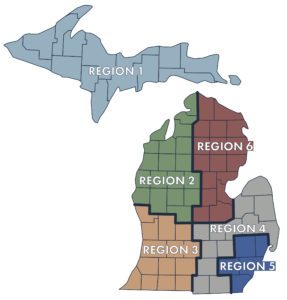Filing period opens for MAC Board elections at Annual Conference
 County commissioners interested in serving on the MAC Board of Directors have until Aug. 23, 2024, to file for elections to fill five seats on the Board at the 2024 Michigan Counties Annual Conference.
County commissioners interested in serving on the MAC Board of Directors have until Aug. 23, 2024, to file for elections to fill five seats on the Board at the 2024 Michigan Counties Annual Conference.
The elections will be held on Sept. 25 at the conference at the Grand Traverse Resort. To be an official candidate, commissioners must file official notice of their intent to run. Applications are due by 4 p.m. on Aug. 23, 2024.
Four seats available represent regions, so will be decided by a vote in that specific region. The at-large seat is determined by votes in all six MAC regions.
To download an application form, go to https://bit.ly/2024appform.
The MAC Board of Directors is the key body in guiding the legislative and organizational strategies of MAC. Board terms are three years in length and individuals may serve up to three terms.
Following seats are vacant and will be filled at the 2024 Annual Conference:
- Region I, Seat A (Open seat)
- Region II, Seat A (Bryan Kolk of Newaygo County is the incumbent)
- Region III, Seat A (Rick Shaffer of St. Joseph County is the incumbent)
- Region V, Seat B (Sarah Lucido of Macomb County is the incumbent)
- At-large, Seat C (Melissa Daub of Wayne County is the incumbent)
No director shall serve more than three full three-year terms, except in certain situations where a director is filling a vacancy in an unexpired term. If the elected replacement shall serve more than half of the unexpired term, it shall be considered as if such person has served one full term for purposes of term limits. If the person filling the vacancy shall serve less than half of the unexpired term, that person shall be permitted to serve up to three additional full 3-year terms.
Candidates who file are also encouraged to submit a statement of up to 400 words on why members should support them. These statements will be posted to the MAC website in late August.
If you have any questions about Board duties, please contact Executive Director Stephan W. Currie at 517-372-5374 or scurrie@micounties.org.
Prisoner release credit bills get first look in Senate
 Legislation to allow certain prisoners to earn productivity credits to reduce their sentence received its first hearing this week in the Senate Committee on Civil Rights, Judiciary, and Public Safety.
Legislation to allow certain prisoners to earn productivity credits to reduce their sentence received its first hearing this week in the Senate Committee on Civil Rights, Judiciary, and Public Safety.
Senate Bills 861–864 would only apply to future sentences in allowing prisoners to receive productivity credits. Under the legislation, prosecutors are required to notify victims at the time of sentencing that an earlier release date is possible, if the offender completes productivity credits.
While completing productivity credits would deem a prisoner eligible for early release, the parole board will still make final decisions regarding release dates, with final discretion remaining with judges and prosecutors.
SBs 861-864 would remove truth-in-sentencing, leaving many victims of crime with uncertainty regarding the minimum sentence their offender would serve.
MAC is opposing the legislation, alongside the Prosecuting Attorneys Association of Michigan, the Michigan Sheriffs’ Association and the Michigan Attorney General’s Office.
For more information on this issue, contact Samantha Gibson at gibson@micounties.org.
Bill to expand options for opioid ‘antagonists’ gets Senate hearing
 Legislation to expand the available options of opioid “antagonists,” or medication that blocks the effects of opioids, to local governments and others received a hearing in the Senate Committee on Health Policy this week.
Legislation to expand the available options of opioid “antagonists,” or medication that blocks the effects of opioids, to local governments and others received a hearing in the Senate Committee on Health Policy this week.
Senate Bill 542 would allow a government entity that received an opioid antagonist from the Michigan Department of Health and Human Services (MDHHS) at no cost to choose the formulation, type of delivery service, method of administration or dosage of the opioid antagonist. The ability to decide on formulation or dosage only applies if the formulation or dosage chosen would not result in a loss of Federal funding.
Counties currently can utilize the MDHHS naloxone (an opioid antagonist) portal to access naloxone at no cost. SB 542 expands the type of opioid antagonist available to government entities through the MDHHS portal.
MAC supports SB 542 and efforts to expand resources to counties for reduction, treatment and prevention of the opioid epidemic.
For more information on this issue, contact Samantha Gibson at gibson@micounties.org.
Targets set, legislative sessions in question
 All budget subcommittee chairs, save those responsible for the School Aid budget, have received their target numbers for their respective fiscal 2025 budgets. Targets are key to negotiating the final version of state budget between the legislative chambers and the administration and setting them is the next to last step to completing the budget for the year starting Oct. 1.
All budget subcommittee chairs, save those responsible for the School Aid budget, have received their target numbers for their respective fiscal 2025 budgets. Targets are key to negotiating the final version of state budget between the legislative chambers and the administration and setting them is the next to last step to completing the budget for the year starting Oct. 1.
Following the negotiations between chambers to rectify the differences in their budget bills is the passage of the bills in conference committees, with both chambers set to take a concurrence vote. The major hold-up has been the battle between the parties on $670 million that the Democrats want to use to fund the Michigan Public School Employees Retirement System (MPSERS). By allocating these dollars to MPSERS, school employees would be relieved of paying 3 percent of their salaries to cover retiree health care.
Should the chambers agree to allocate this $670 million, the Republicans in the Senate, however, may not be willing to join Democrats in granting immediate effect to the budget, meaning the Legislature would have to adjourn sine die early for the budget bills to take effect by Oct. 1. We faced this same issue last year during budget negotiations and a messy dispute was avoided. But this year is an election year for the House and the Republicans could disrupt any plans the Democrats have for “lame duck” sessions in late 2024 by forcing an early adjournment.
More will be known next week when the Legislature is supposed to vote on budget bills.
For more information on this issue, contact Deena Bosworth at bosworth@micounties.org.
Clock is ticking on compliance with energy siting law, expert tells Podcast 83
 County officials need to be taking concrete actions now to prepare for the November implementation of a controversial state law on siting renewable energy facilities, a University of Michigan analyst told Podcast 83 in a new episode.
County officials need to be taking concrete actions now to prepare for the November implementation of a controversial state law on siting renewable energy facilities, a University of Michigan analyst told Podcast 83 in a new episode.
“If you hire outside legal counsel, or if you have outside planning experts, like you need to get them on retainer now because everybody is going to be changing their ordinances between August and the end of the year,” said Sarah Mills of the university’s Center for EmPowering Communities.
Public Act 233 was adopted in 2023 despite opposition from MAC and others due to its assault on local control by giving ultimate authority on siting decisions to the unelected Public Service Commission (PSC).
In a wide-ranging discussion with host Stephan Currie and MAC’s Madeline Fata, Mills explained that the law still leaves local governments with responsibilities ― and opportunities.
“One of the things that’s really important is to think about what the law does, and what it doesn’t do,” Mills said. “So zoning is still in effect; local governments can still zone for renewables. It’s just for those biggest projects. So solar projects that are over about 400 acres, wind projects that are like 330 or so and then energy storage projects, which we don’t have very many of right now. But this kind of scale of project that we’re talking about is something that could be on as little as five acres of land.”
Mills noted that the PSC will be issuing its final draft recommendations on how to implement the law on June 21, then the body will take feedback on them (click here to see where to provide such feedback) before issuing the final official plan around Aug. 9.
In the meantime, Mills said, counties need to decide whether they’ll adopt an ordinance at all, a compatible renewable energy ordinance (CREO) or a workable ordinance that allows locals to set criteria outside of the law but that might still be attractive to developers.
View the full episode, recorded on June 4, by clicking here.
Previous episodes can be seen at MAC’s YouTube Channel.
And you always can find details about Podcast 83 on the MAC website.
Treasury booth at MAC conferences sparks $250,000 in potential repayments
 A booth at MAC’s 2024 Legislative Conference has started the process for claims that could mean thousands of dollars in currently unclaimed property.
A booth at MAC’s 2024 Legislative Conference has started the process for claims that could mean thousands of dollars in currently unclaimed property.
Twenty-one claims were established by the Michigan Department of Treasury staff at the conference after they performed 64 searches on April 29 during the first day of the conference. Treasury says the total amount being claimed, both by individuals and counties themselves, is $172,300.
This is on top of the $90,225 in claims begun via a similar booth at MAC’s 2023 Annual Conference last fall.
For those who have questions about their claim status, call Treasury’s claim assistance line at 517-636-5320 between 9 a.m. and 2 p.m., Monday-Friday.
NACo academy can help your key employees hone their skills
 Strengthen your team and improve your county’s future performance by giving your emerging all-stars — or yourself — an opportunity to level up.
Strengthen your team and improve your county’s future performance by giving your emerging all-stars — or yourself — an opportunity to level up.
Do you oversee program directors or other managers that you’d like to catapult into progressively more responsibility and growing effectiveness? Then send them through the National Association of Counties’ High Performance Leadership Academy, a virtual course that will run from Aug. 6 to Nov. 8.
Attendees will learn to plan, lead and sustain positive innovations across county government in the context of growing uncertainty and cascading challenges.
The 12-week course uses real-time webinars, self-paced activities and cohort-based learning, totaling about five hours per week. Request more information for your county at www.naco.org/skills today!
 Staff picks
Staff picks
- Limited access to health care can lead to higher rural death rates (Alpena News)
- Stateside Podcast: Muskegon welcomes increase in cruise tourism (Michigan Public Radio)
- The slow recovery of property values in counties hit hardest by the Great Recession (Citizens Research Council of Michigan)
- African elephants call each other by unique names, new study shows (Associated Press)
